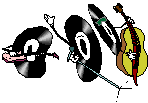

Stop music: SQUARE button.
Play music: ARROW button.
"poetry reproducing the sound and feel of jazz through literary style"
"demonstrates jazz-like rhythm or the feel of improvisation"
See also: What is Jazz? and Jazz Poetry.
Sterling Allen Brown
I
When Ma Rainey
Comes to town,
Folks from anyplace
Miles aroun',
From Cape Girardeau,
Poplar Bluff,
Flocks in to hear
Ma do her stuff;
Comes flivverin' in,
Or ridin' mules,
Or packed in trains,
Picknickin' fools. . . .
That's what it's like,
Fo' miles on down,
To New Orleans delta
An' Mobile town,
When Ma hits
Anywheres aroun'.
II
Dey comes to hear Ma Rainey from de little river settlements,
From blackbottorn cornrows and from lumber camps;
Dey stumble in de hall, jes a-laughin' an' a-cacklin',
Cheerin' lak roarin' water, lak wind in river swamps.
An' some jokers keeps deir laughs a-goin' in de crowded aisles,
An' some folks sits dere waitin' wid deir aches an' miseries,
Till Ma comes out before dem, a-smilin' gold-toofed smiles
An' Long Boy ripples minors on de black an' yellow keys.
III
O Ma Rainey,
Sing yo' song;
Now you's back
Whah you belong,
Git way inside us,
Keep us strong. . . .
O Ma Rainey,
Li'l an' low;
Sing us 'bout de hard luck
Roun' our do';
Sing us 'bout de lonesome road
We mus' go. . . .
IV
I talked to a fellow, an' the fellow say,
"She jes' catch hold of us, somekindaway.
She sang Backwater Blues one day:
'lt rained fo' days an' de skies was dark as night,
Trouble taken place in de lowlands at night.
'Thundered an' lightened an' the storm begin to roll
Thousan's of people ain't got no place to go.
'Den I went an' stood upon some high ol' lonesome hill,
An' looked down on the place where I used to live.'
An' den de folks, dey natchally bowed dey heads an' cried,
Bowed dey heavy heads, shet dey moufs up tight an' cried,
An' Ma lef' de stage, an' followed some de folks outside."
Dere wasn't much more de fellow say:
She jes' gits hold of us dataway.
1932
Sterling Allen Brown
(1927, Black & Tan Chicago)
Rich, flashy, puffy-faced,
Hebrew and Anglo-Saxon,
The overlords sprawl here with their glittering darlings.
The smoke curls thick, in the dimmed light
Surreptitiously, deaf-mute waiters
Flatter the grandees,
Going easily over the rich carpets,
Wary lest they kick over the bottles
Under the tables.
The jazzband unleashes its frenzy.
Now, now,
To it, Roger; that's a nice doggie,
Show your tricks to the gentlemen.
The trombone belches, and the saxophone
Wails curdlingly, the cymbals clash,
The drummer twitches in an epileptic fit
Muddy water
Round my feet
Muddy water
The chorus sways in.
The 'Creole Beauties from New Orleans'
(By way of Atlanta, Louisville, Washington, Yonkers,
With stop-overs they've used nearly all their lives)
Their creamy skin flushing rose warm,
O, le bal des belles quarterounes! *
Their shapely bodies naked save
For tattered pink silk bodices, short velvet tights,
And shining silver-buckled boots;
Red bandannas on their sleek and close-clipped hair;
To bring to mind (aided by the bottles under the tables)
Life upon the river--
Muddy water, river sweet
(Lafitte the pirate, instead,
And his doughty diggers of gold)
There's peace and happiness there
I declare
(In Arkansas,
Poor half-naked fools, tagged with identification numbers,
Worn out upon the levees,
Are carted back to the serfdom
They had never left before
And may never leave again)
Bee--dap--ee--DOOP, dee-ba--dee-BOOP
The girls wiggle and twist
Oh you too,
Proud high-stepping beauties,
Show your paces to the gentlemen.
A prime filly, seh.
What am I offered, gentlemen, gentlemen. . . .
I've been away a year today
To wander and roam
I don't care if it's muddy there
(Now that the floods recede,
What is there left the miserable folk?
Oh time in abundance to count their losses,
There is so little else to count.)
Still it's my home, sweet home
From the lovely throats
Moans and deep cries for home:
Nashville, Toledo, Spout Springs, Boston,
Creoles from Germantown;--
The bodies twist and rock;
The glasses are filled up again. . . .
(In Mississippi
The black folk huddle, mute, uncomprehending,
Wondering 'how come the good Lord
Could treat them this a way')
shelter
Down in the Delta
Along the Yazoo
The buzzards fly over, over, low,
Glutted, but with their scrawny necks stretching,
Peering still.)
I've got my toes turned Dixie ways
Round that Delta let me laze
The band goes mad, the drummer throws his sticks
At the moon, a papier-mache moon,
The chorus leaps into weird posturings,
The firm-fleshed arms plucking at grapes to stain
Bending, writhing, turning
My heart cries out for
M U D D Y W A T E R
(Down in the valleys
The stench of the drying mud
Is a bitter reminder of death.)
Dee da dee D A A A A H
1932
* (French) "Oh, the ball of the beautiful quadroons."
Gwendolyn Bennett
I am weaving a song of waters,
Shaken from firm, brown limbs,
Or heads thrown back in irreverent mirth.
My song has the lush sweetness
Of moist, dark lips
Where hymns keep company
With old forgotten banjo songs.
Abandon tells you
That I sing the heart of race
While sadness whispers
That I am the cry of a soul. . . .
A-shoutin' in de ole camp-meeting-place,
A-strummin' o' de ole banjo.
Singin' in de moonlight,
Sobbin' in de dark.
Singin', sobbin', strummin' slow . . .
Singin' slow, sobbin' low.
Strummin', strummin', strummin' slow . . .
Words are bright bugles
That make the shining for my song,
And mothers hold down babies
To dark, warm breasts
To make my singing sad.
A dancing girl with swaying hips
Sets mad the queen in the harlot's eye.
Praying slave
Jazz-band after
Breaking heart
To the time of laughter . . .
Clinking chains and minstrelsy
Are wedged fast with melody.
A praying slave
With a jazz-band after . . .
Singin' slow, sobbin' low.
Sun-baked lips will kiss the earth.
Throats of bronze will burst with mirth.
Sing a little faster,
Sing a little faster,
Sing!
1926
Helene Johnson
Little brown boy,
Slim, dark, big-eyed,
Crooning love songs to your banjo
Down at the Lafayerre--
Gee, boy, I love the way you hold your head,
High sort of and a bit to one side,
Like a prince, a jazz prince. And I love
Your eyes flashing, and your hands,
And your patent-leathered feet,
And your shoulders jerking the jig-wa.
And I love your teeth flashing,
And the way your hair shines in the spotlight
Like it was the real stuff.
Gee, brown boy, I loves you all over.
I'm glad I'm a jig. I'm glad I can
Understand your dancin' and your
Singin', and feel all the happiness
And joy and don't care in you.
Gee, boy, when you sing, I can close my ears
And hear tom-toms just as plain.
Listen to me, will you, what do I know
About tom-toms? But I like the word, sort of,
Don't you? It belongs to us.
Gee, boy, I love the way you hold your head,
And the way you sing, and dance,
And everything.
Say, I think you're wonderful. You're
Allright with me,
You are.
1927
Helene Johnson
You are disdainful and magnificent--
Your perfect body and your pompous gait,
Your dark eyes flashing solemnly with hate;
Small wonder that you are incompetent
To imitate those whom you so dispise--
Your shoulders towering high above the throng,
Your head thrown back in rich, barbaric song,
Palm trees and manoes stretched before your eyes.
Let others toil and sweat for labor's sake
And wring from grasping hands their meed of gold.
Why urge ahead your supercilious feet?
Scorn will efface each footprint that you make.
I love your laughter, arrogant and bold.
You are too splendid for this city street!
1927
Langston Hughes
Oh, silver tree!
Oh, shining rivers of the soul!
In a Harlem cabaret
Six long-headed jazzers play.
A dancing girl whose eyes are bold
Lifts high a dress of silken gold.
Oh, singing tree!
Oh, shining rivers of the soul!
Were Eve's eyes
In the first garden
Just a bit too bold?
Was Cleopatra gorgeous
In a gown of gold?
Oh, shining tree!
Oh, silver rivers of the soul!
In a whirling cabaret
Six long-headed jazzers play.
1926
Langston Hughes
I could take the Harlem night
and wrap around you,
Take the neon lights and make a crown,
Take the Lenox Avenue busses,
Taxis, subways,
And for your love song tone their rumble down.
Take Harlem's heartbeat,
Make a drumbeat,
Put it on a record, let it whirl,
And while we listen to it play,
Dance with you till day--
Dance with you, my sweet brown Harlem girl.
1950
Langston Hughes
Good morning, daddy!
Ain't you heard
The boogie-woogie rumble
Of a dream deferred?
Listen closely:
You'll hear their feet
Beating out and beating out a --
You think
It's a happy beat?
Listen to it closely:
Ain't you heard
something underneath
like a --
What did I say?
Sure,
I'm happy!
Take it away!
Hey, pop!
Re-bop!
Mop!
Y-e-a-h!
1951
Langston Hughes
The Negro
With the trumpet at his lips
Has dark moons of weariness
Beneath his eyes
where the smoldering memory
of slave ships
Blazed to the crack of whips
about thighs
The negro
with the trumpet at his lips
has a head of vibrant hair
tamed down,
patent-leathered now
until it gleams
like jet--
were jet a crown
the music
from the trumpet at his lips
is honey
mixed with liquid fire
the rhythm
from the trumpet at his lips
is ecstasy
distilled from old desire--
Desire
that is longing for the moon
where the moonlight's but a spotlight
in his eyes,
desire
that is longing for the sea
where the sea's a bar-glass
sucker size
The Negro
with the trumpet at his lips
whose jacket
Has a fine one-button roll,
does not know
upon what riff the music slips
It's hypodermic needle
to his soul
but softly
as the tune comes from his throat
trouble
mellows to a golden note
Langston Hughes
"Me an' ma baby's
Got two mo' ways,
Two mo' ways to do de Charleston!"
Da, da,
Da, da, da!
Two mo' ways to do de Charleston!"
Soft light on the tables,
Music gay,
Brown-skin steppers
In a cabaret.
White folks, laugh!
White folks, pray!
"Me an' ma baby's
Got two mo' ways,
Two mo' ways to do de
Charleston!"
1926
Carl Sandburg
It's a jazz affair, drum crashes and cornet razzes.
The trombone pony neighs and the tuba jackass snorts.
The banjo tickles and titters too awful.
The chippies talk about the funnies in the papers.
The cartoonists weep in their beer.
Ship riveters talk with their feet
To the feet of floozies under the tables.
A quartet of white hopes mourn with interspersed snickers:
"I got the blues.
I got the blues.
I got the blues."
And . . . as we said earlier:
The cartoonists weep in their beer.
1920
Carl Sandburg
Drum on your drums, batter on your banjoes,
sob on the long cool winding saxophones.
Go to it, O jazzmen.
Sling your knuckles on the bottoms of the happy
tin pans, let your trombones ooze, and go husha-
husha-hush with the slippery sand-paper.
Moan like an autumn wind high in the lonesome treetops,
moan soft like you wanted somebody terrible, cry like a
racing car slipping away from a motorcycle cop, bang-bang!
you jazzmen, bang altogether drums, traps, banjoes, horns,
tin cans -- make two people fight on the top of a stairway
and scratch each other's eyes in a clinch tumbling down
the stairs.
Can the rough stuff . . . now a Mississippi steamboat pushes
up the night river with a hoo-hoo-hoo-oo . . . and the green
lanterns calling to the high soft stars . . . a red moon rides
on the humps of the low river hills . . . go to it, O jazzmen.
1919
Frank Marshall Davis
Play that thing, you jazz mad fools!
Boil a skyscraper with a jungle
Dish it to 'em sweet and hot--
Ahhhhhhhhh
Rip it open then sew it up, jazz band!
Thick bass notes from a moon faced drum
Saxophones moan, banjo strings hum
High thin notes from the cornet's throat
Trombone snorting, bass horn snorting
Short tan notes from the piano
And the short tan notes from the piano
Plink plank plunk a plunk
Plink plank plunk a plunk
Chopin gone screwy, Wagner with the blues
Plink plank plunk a plunk
Got a date with Satan--ain't no time to lose
Plink plank plunk a plunk
Strut it in Harlem, let Fifth Avenue shake it slow
Plink plank plunk a plunk
Ain't goin' to heaven nowhow--
crowd up there's too slow . . .
Plink plank plunk a plunk
Plink plank plunk a plunk
Plunk
Do that thing, jazz band!
Whip it to a jelly
Sock it, rock it; heat it, beat it; then fling it at 'em
Let the jazz stuff fall like hail on king and truck driver, queen and
laundress, lord and laborer, banker and bum
Let it fall in London, Moscow, Paris, Hongkong, Cairo, Buenos Aires,
Chicago, Sydney
Let it rub hard thighs, let it be molten fire in the veins of dancers
Make 'em shout a crazy jargon of hot hosannas to a fiddle-faced jazz
god
Send Dios, Jehovah, Gott, Allah, Buddha past in a high stepping
cake walk
Do that thing, jazz band!
Your music's been drinking hard liquor
Got shanghaied and it's fightin' mad
Stripped to the waist feein' ocean liner bellies
Big burly bibulous brute
Poet hands and bone crusher shoulders--
Black sheep or white?
Hey, Hey!
Pick it, papa!
Twee twa twee twa twa
Step on it, black boy
Do re mi fa sol la ti do
Boomp boomp
Play that thing, you jazz mad fools!
1935
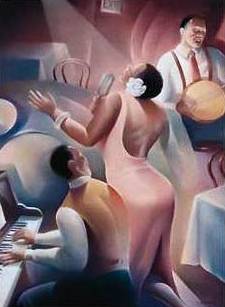
"Blues" (contemporary)
by Jesse Reisch
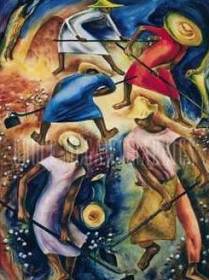
"Poor Man's Cotton" (1944)
by Hale A. Woodruff
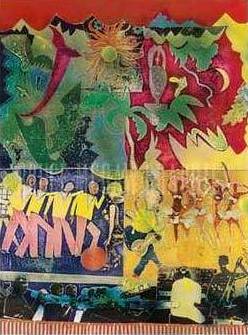
"Wrapping It Up at the Lafayette"
(contemporary) by Romare Bearden
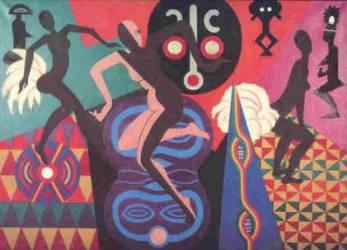
[Title unknown] by Lois Mailou Jones

"Hot Still-Scape for Six Colors--
Seventh
Avenue Style" (1940)
by Stuart Davis
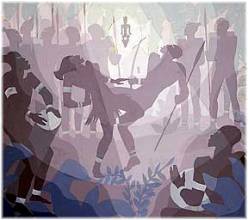
"Negro in an African Setting" (1934)
by Aaron Douglas
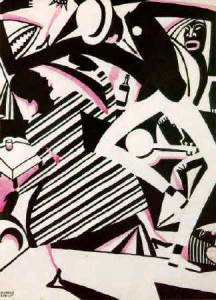
"Interpretation of Harlem Jazz"
(1925)
by Winold Reiss
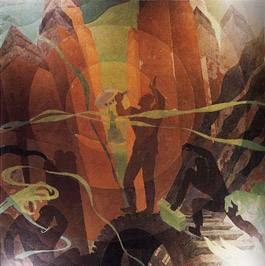
"Aspects of Negro Life:
A Song of
the Towers" (1934)
by Aaron Douglas

"Les Fetiches" (1938)
by Lois Mailou Jones
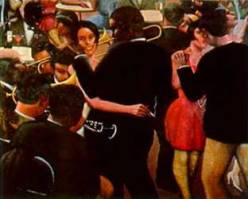
"Blues" (1929) by Archibald J. Motley Jr.

"Jazz: Icarus" (1943) by Henri Matisse
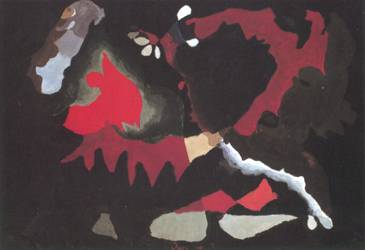
"Swing Music (Louis Armstrong) "
(1938)
by Arthur G. Dove.
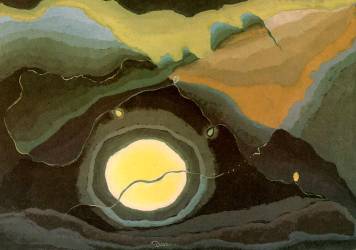
"Me and the Moon" (1937)
by Arthur G. Dove
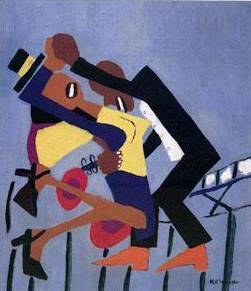
"Jitterbugs" (c. 1941) by William Johnson
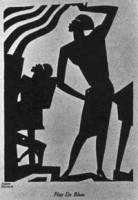
"Play de Blues"
by Aaron Douglas
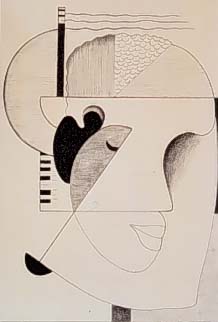
"Lenox Avenue (1938)
by Sargent Johnson

"Harlem" (1946)
by Jacob Lawrence
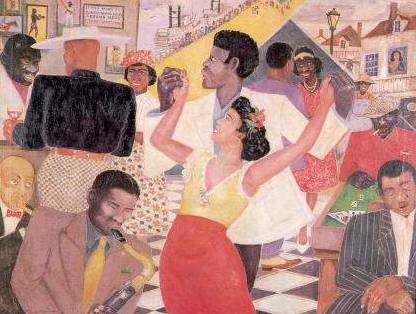
"Beale Street Blues" (1938)
Palmer Hayden
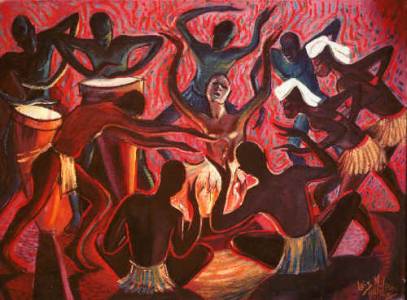
"Tribal Dancing" by Lois Mailou Jones
(prose selection)
When I sit in the drafty basement that is The New World Cabaret with a white person, my color comes. We enter chatting about any little nothing that we have in common and are seated by the jazz waiters. In the abrupt way that jazz orchestras have, this one plunges into a number. It loses no time in circumlocutions, but gets right down to business. It constricts the thorax and splits the heart with its tempo and narcotic harmonies. This orchestra grows rambunctious, rears on its hind legs and attacks the tonal veil with primitive fury, rending it, clawing it until it breaks through to the jungle beyond. I follow those heathen--follow them exultingly. I dance wildly inside myself; I yell within, I whoop; I shake my assegai [spear] above my head, I hurl it true to the mark yeeeeooww! I am in the jungle and living in the jungle way. My face is painted red and yellow and my body is painted blue. My pulse is throbbing like a war drum. I want to slaughter something--give pain, give death to what, I do not know. But the piece ends. The men of the orchestra wipe their lips and rest their fingers. I creep back slowly to the veneer we call civilization with the last tone and find the white friend sitting motionless in his seat, smoking calmly.
"Good music they have here," he remarks, drumming the table with his fingertips.
Music. The great blobs of purple and red emotion have not touched him. He has only heard what I felt. He is far away and I see him but dimly across the ocean and the continent that have fallen between us. He is so pale with his whiteness then and I am so colored.
1928
Go to Nichols Home Page.
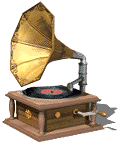
Background MIDI: Bessie Smith's "Backwater Blues"
Source:
Ragtime Press
This page is for educational use only.
E-mail comments/suggestions: knichols
Last updated: 9/10/12